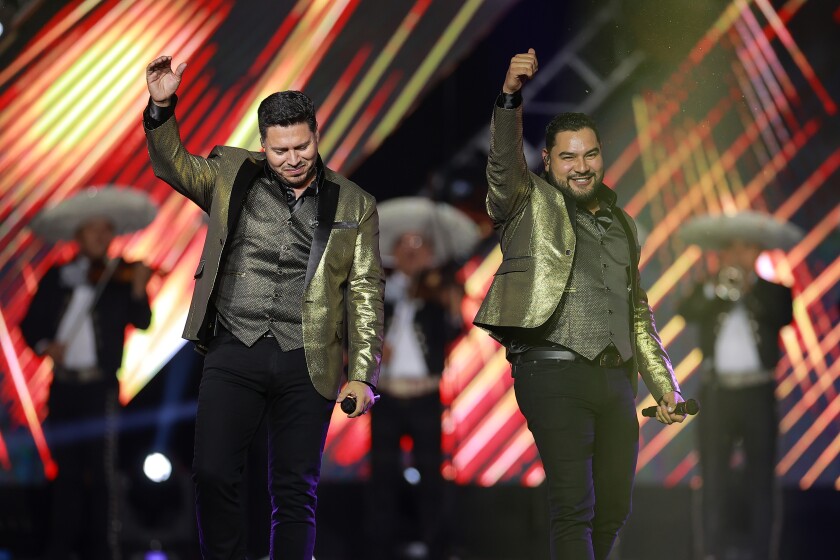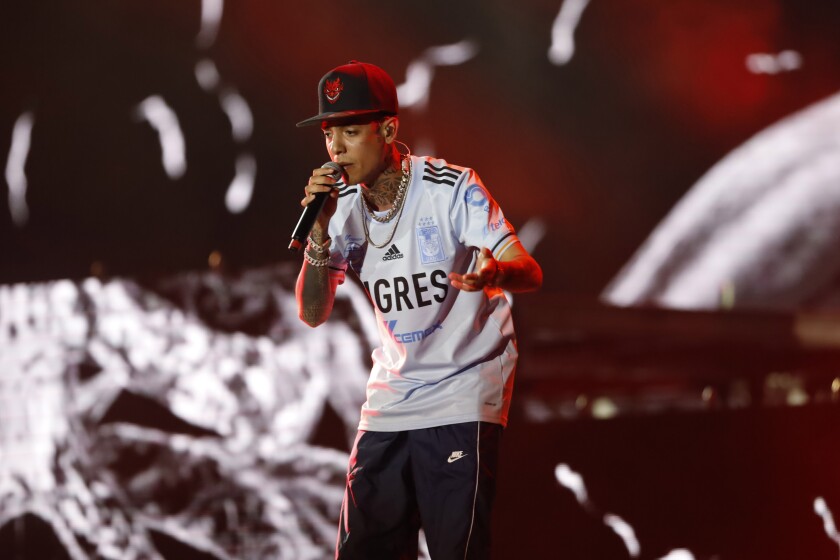Grupo Firme, the Latin Grammy-winning norteño band, has counted many hits under its silver-buckled belts over the years: “El Tóxico,” “Ya Supérame” and 2021’s “Cada Quien,” co-starring reggaeton-pop heartthrob Maluma, to name a few.
In March, the Tijuana players held a press conference at Inglewood’s SoFi Stadium to announce their upcoming “Enfiestados y Amanecidos” tour of the States — and generate some buzz ahead of their debut at this year’s Coachella Valley Arts and Music Festival.
“We’re putting our boots on,” said Grupo Firme vocalist Eduin Caz, “and bringing a Mexican party to the United States.”
This weekend, Grupo Firme, along with Banda MS and Natanael Cano — three of today’s most prominent regional Mexican acts, as the genre is known — will all make their first appearances at Coachella. They join a tidal wave of performers from Latin America set to perform this weekend and next, including Brazilian pop powerhouses Anitta and Pabllo Vittar, Colombian reggaetonera Karol G and Argentine singers Nathy Peluso and Nicki Nicole.
Altogether, 20 artists from Latin America and its diaspora will play Coachella this year, up from 17 at 2019’s edition.
Coachella’s promoter, Goldenvoice, has made concerted efforts to captivate Latino audiences in recent years, whether by recruiting more Latin acts to Coachella’s roster or by organizing events like L.A.’s (now discontinued) Latin music and food festival, Tropicália. These efforts have dovetailed with the astronomical growth of Latin music revenue in the U.S., which according to a RIAA report released Tuesday, generated an all-time high of more than $886.1 million in 2021 through streaming, subscriptions and retail sales.
A smattering of Latino artists have performed at Coachella since its inception in 2001, including Café Tacvba, Julieta Venegas, Nortec Collective and Los Ángeles Azules.
However, 2019 marked a breakthrough for Spanish-language acts at the festival. Reggaeton titans Bad Bunny and J Balvin received prime slots, while flamenco fusion artist Rosalía performed a much-buzzed-about set.
That same year, Grammy-nominated norteño group Los Tucanes de Tijuana became the first regional Mexican act to perform at Coachella. The band not only regaled fans with its classic corridos — folk ballads reserved for telling stories of outlaws and other legends — but the accordion-fluttering bustle of its wedding-party staple “La Chona” was so infectious that the audience, a mixture of Latinos and curious anglophones, begged for a reprise, to which Los Tucanes obliged.
Natanael Cano will perform for the first time at Coachella. “I’m extremely grateful and excited to bring my culture to Coachella.”
(Medios y Media / Getty Images)
Performing this Sunday, Sonora-born singer-songwriter Natanael Cano, 21, has contributed to corridos’ popularity among Gen Z. Signed to L.A. label Rancho Humilde, Cano has stoked interest in the norteño art form by combining acoustic guitar licks with trap beats and a melodic flow inspired by rappers like Drake and Bad Bunny.
“Every time someone mentioned the festival to me, they’d say how hard it is to get in. I never really saw myself being invited,” said Cano over the phone. “But I’m extremely grateful and excited to bring my culture to Coachella. I want the world to enjoy and get a good clear view of where I come from, and why I love it so much.”

Alan Manuel Ramirez and Oswaldo Silvas of Banda MS.
(Manuel Velasquez / Getty Images for Estrella Media)
Members of Banda Sinaloense MS de Sergio Lizárraga, better known as Banda MS, were similarly excited to see the band’s name in the second billing for the festival, on par with Doja Cat and Run the Jewels. But according to Oswaldo Silvas, vocalist of Banda MS, they don’t see themselves gaining a new audience so much as they see an audience gaining a new experience.
“I think the real challenge is actually for the people who don’t know banda music, people who don’t even know Spanish,” Silvas said. “I just hope it can provoke something in them — to make them move, dance, scream, whatever — but something positive about Mexico.”
Masters of the brass-heavy genre known as banda, the Mazatlán, Sinaloa, group have not only earned 12 Billboard Latin Music Awards, but they have smartly navigated their ascent by collaborating with artists across borders, like Snoop Dogg and Becky G in 2020’s “Qué Maldición.”
“We are committed, not just to a good show, but to open doors for more banda music at Coachella,” said Silvas. “We’re just down to make something interesting happen.”

